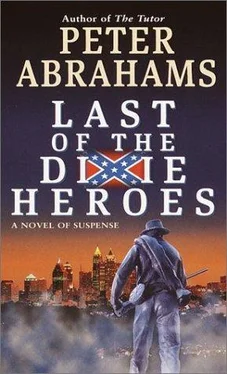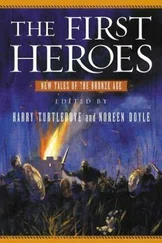Peter Abrahams - Last of the Dixie Heroes
Здесь есть возможность читать онлайн «Peter Abrahams - Last of the Dixie Heroes» весь текст электронной книги совершенно бесплатно (целиком полную версию без сокращений). В некоторых случаях можно слушать аудио, скачать через торрент в формате fb2 и присутствует краткое содержание. Жанр: Триллер, на английском языке. Описание произведения, (предисловие) а так же отзывы посетителей доступны на портале библиотеки ЛибКат.
- Название:Last of the Dixie Heroes
- Автор:
- Жанр:
- Год:неизвестен
- ISBN:нет данных
- Рейтинг книги:4 / 5. Голосов: 1
-
Избранное:Добавить в избранное
- Отзывы:
-
Ваша оценка:
- 80
- 1
- 2
- 3
- 4
- 5
Last of the Dixie Heroes: краткое содержание, описание и аннотация
Предлагаем к чтению аннотацию, описание, краткое содержание или предисловие (зависит от того, что написал сам автор книги «Last of the Dixie Heroes»). Если вы не нашли необходимую информацию о книге — напишите в комментариях, мы постараемся отыскать её.
Last of the Dixie Heroes — читать онлайн бесплатно полную книгу (весь текст) целиком
Ниже представлен текст книги, разбитый по страницам. Система сохранения места последней прочитанной страницы, позволяет с удобством читать онлайн бесплатно книгу «Last of the Dixie Heroes», без необходимости каждый раз заново искать на чём Вы остановились. Поставьте закладку, и сможете в любой момент перейти на страницу, на которой закончили чтение.
Интервал:
Закладка:
Roy was flowing too, no doubt about it, an easy mover, all of a sudden, in the night. He knew, absolutely knew, that the owl, his owl, was hovering over him, just above the trees, and he also knew that his owl was the descendant of the owls of 1863, owls that had gazed down with their huge eyes on Roy Singleton Hill. He was ready, despite a little bit of dizziness in his head, a little bit of fuzziness around the edges of his vision, for anything.
Ready, for example, for that campfire in a tiny clearing in the middle distance. He didn’t creep up on it, just walked to the edge of the trees, invisible. Two men sat by the fire, both with blankets over their shoulders, but Roy could see that one wore blue, the other gray. The man in gray drank from a silver flask. The man in blue said, “Fifteen two, fifteen four, and a pair is six.”
“You’re the luckiest son of a bitch I ever met,” said the man in gray, a little drunk-Roy could hear it. The man in gray a little drunk, while the man in blue sounded sober: it pissed him off.
Roy could also hear popping sounds from the fire and a much fainter crackle that he took to be incinerating pine needles, heard too the shuffling of cards as he circled the clearing and entered enemy territory; and yes, heard the beating of heavy wings, high above. He got the idea that this was the way Roy Singleton Hill had heard, so clearly, so precisely, and felt a bit chilly. But it was a chilly night, had to be: why else would the pickets have covered themselves with blankets?
Roy came out of the woods. Ahead lay the Yankee camp, a second convoy in the moonlight, bigger by a row or two than his own. Roy passed right by the tents, within feet of them, the light so strong he could read the words stitched on a regimental flag: Wilderness, Antietam, Stone’s River, Chancellorsville, Bull Run, Gettysburg, Chickamauga. He was awake and in their sleeping camp. It was thrilling: had he ever been thrilled like this in his life? Had Roy Singleton Hill? Many times, for sure: many, many, riding with Forrest on nights just like this. A little breeze sprang up and the flag came to life, brushing against his arm. Roy moved on.
He picked up that silver flash from the far end of camp, saw Lee gliding toward the outermost tent. Moon, tent, guy ropes, knife-all silver, all connected in a way that made sense, so he knew what was going to happen before it did, very unusual, maybe unique, for him. Lee stepped up to the nearest guy rope of the outermost tent, slashed it through in a single motion, then scrambled around the tent very fast, slashing, slashing. The tent subsided, sank to the ground, revealing the Porta Potti eight or ten yards beyond. A voice rose from inside the fallen tent, a boy’s voice, disoriented, scared. Lee paused, perhaps surprised, his back to the Porta Potti. And out from behind the Porta Potti stepped Sergeant Vandam in his underwear, the moon shining on his round white belly, his navel like a crater.
Roy knew just what to do: raise his gun and shoot Sergeant Vandam; the instructions, he realized, his instructions, were carved into the wood of the stock. But he hadn’t brought his gun, and there were no bullets, just blank cartridges. Roy did the next best thing, did it without thinking: he clapped his hands, just once, like a gunshot but softer.
That got their attention: first Vandam, whose eyes were on him right away, then Lee, not quite as quick, who looked first at Roy, then spun around and saw Vandam. Vandam was already moving, but Roy had seen the way Lee could run and knew Vandam would never catch him. At that moment, the boy’s voice came from inside the collapsed tent again: “Dad! Dad!” And Lee, half turning, about to take that first running step in Roy’s direction, froze instead.
Froze: because this was all pretend, all make-believe, and Lee hadn’t known there’d be a boy in that tent. It was just a prank. Roy understood what was going on in Lee’s mind, and also learned something about Lee: he didn’t quite have it.
Vandam hit Lee from behind-airborne, fully laid out, his shoulder ramming the middle of Lee’s spine. Lee bent backward, doubling in the wrong direction like a contortionist, his butternut jacket ripping open in front from the force of the blow. The knife spun in the moonlight. Lee went down hard, Vandam on top of him. By that time, Roy was right there, although he had no recollection of how. He spoke, a rough, raw voice that wasn’t his: “Let him go.” But actually: “Le’ ’im go,” closer to backwoods than he’d ever spoken.
“I’ll get to you,” Vandam said, barely glancing at him, and drew back his fist a foot above Lee’s ear. Roy grabbed Vandam’s wrist, hauled him off. Just that easy, the way an actor handles a suitcase from the prop department. Vandam didn’t like it. He aimed the punch he’d prepared for Lee at Roy instead, a punch that landed in Roy’s middle, made him feel sick. But it could have been worse, could have been to the head, and Roy was landing one of his own at the same time, the first punch he’d thrown since childhood.
Vandam’s nose made a crunching sound, or maybe Roy just felt the crunch in his hand. Then came blood, black in the moonlight, and Vandam staggered back.
“Enemy in camp,” he called. “Enemy in camp.”
Roy snatched Lee off the ground, flung him over his shoulder, took off for the woods. A man with muttonchop sideburns-Captain Peterschmidt-stepped out of a tent, in Roy’s path.
“What the hell’s going on?” he said, fumbling a set of earphones off his head.
“Isn’t this on the schedule?” Roy said, and went right by him, past the tents, across the open field, into the trees, stronger than he’d ever been, dizziness gone, head pain gone, vision restored to its new hyperclarity.
“I’m okay,” Lee said when they were safely in the woods, his lips close to Roy’s ear. “You can put me down.”
“Sure?”
“Sure.”
Roy put Lee down. The crowns of the trees blocked the moonlight. There was no sound of anyone following them, no sound at all but the very soft one of fingertip ridges on rough wool. Roy knew what that had to be: Lee buttoning up his jacket. That brought back to Roy’s mind an image he’d seen for only an instant, an image his mind might not have registered, what with all the commotion. What had he seen when Vandam’s tackle from behind had popped open Lee’s jacket? Only a moonlit glimpse, but the memory was clear in Roy’s mind, he had it now: breasts; soft, pale, unmistakable.
Was Lee waiting for him to say something? He said nothing. There was no more talk. Roy and Lee walked in single file through the woods, Roy leading. They rounded the campfire, now dying, the two pickets asleep side by side, wrapped in their blankets, just touching. Roy heard the beating of heavy wings overhead.
TWENTY
The first thing Roy did when he got home Sunday morning-the commanders on both sides sending all the offenders out of camp for violating USV safety regulations-was check the machine for messages from Rhett. Four-oh-four: Rhett had written the area code on his hand. But there were no messages, none from Rhett, none from anyone else. After that, Roy sat at the kitchen table. For company he had the stack of bills he couldn’t pay, a critical mass ticking silently away, getting ready to blow up house, car, all his material things. He also had the sheet of paper with House Projects on one side and Bills and $ on the other. After a while, he crumpled it up and tossed it in the trash. He noticed a Popsicle stick in there, down at the bottom. Roy didn’t eat Popsicles; Rhett did. Roy reached in, took out the Popsicle stick. There were teeth marks on the end, not big. Roy put the stick in a coffee mug on the shelf.
He took off his uniform, folded it, laid it on the bed, went into the shower. He didn’t shave. Why bother? He opened his closet, the closet he’d shared with Marcia, now three-quarters empty, looked for something to wear. Nothing appealed; not that Roy wanted something new, more fashionable-he’d never been like that-but these clothes, the cotton shirts from the Gap, the khakis from some catalog, the jeans from another, didn’t quite seem like his. In some way, they weren’t even clothes, more like costumes from a play, a drab one he wouldn’t want to see. Roy took a few aspirin for his headache, pulled the shades, and got into bed.
Читать дальшеИнтервал:
Закладка:
Похожие книги на «Last of the Dixie Heroes»
Представляем Вашему вниманию похожие книги на «Last of the Dixie Heroes» списком для выбора. Мы отобрали схожую по названию и смыслу литературу в надежде предоставить читателям больше вариантов отыскать новые, интересные, ещё непрочитанные произведения.
Обсуждение, отзывы о книге «Last of the Dixie Heroes» и просто собственные мнения читателей. Оставьте ваши комментарии, напишите, что Вы думаете о произведении, его смысле или главных героях. Укажите что конкретно понравилось, а что нет, и почему Вы так считаете.












